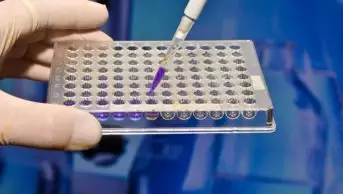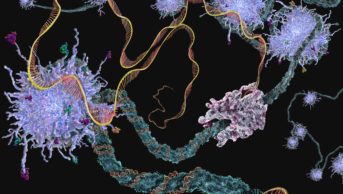
Shutterstock.com
Pharmacogenetic testing could improve drug or dose selection for a fifth of patients prescribed one of 56 common medicines, research has found.
Research carried out at the University of East Anglia analysed a large community pharmacy database to estimate the number of times 56 drugs were prescribed for the first time in the UK during 2019.
The 56 drugs included opioids, proton-pump inhibitors and antidepressants. For each drug selected, a single drug–gene interaction was included in the analysis.
Researchers combined these first prescription estimates with phenotype frequency data to estimate the number of “actionable” drug–gene interactions that occur during daily practice in community pharmacies.
The study defined an “actionable” drug–gene interaction as one that requires intervention; whether a “direct action”, such as adjusting the dose or switching the drug, or an “indirect action”, such as observing the status of the patient carefully or guarding against a maximum dose.
Researchers used guidelines produced by the Dutch Pharmacogenetics Working Group and the Clinical Pharmacogenetics Implementation Consortium to estimate that an actionable drug–gene interaction was present for between 19.1% and 21.1% (5,233,353–5,780,595) of all new prescriptions for the 56 drugs.
They discovered that four genes (CYP2D6, CYP2C19, HLA-B and SCLO1B1) accounted for 95.8% of all drugs initiated with an actionable drug–gene interaction.
“If [pharmacogenetic] testing was performed for all patients with a new prescription for one of 56 commonly prescribed medicines, then one in five of these patients could potentially benefit from either better drug or dose selection,” said David Wright, professor of pharmacy practice at the University of East Anglia and one of the authors of the study.
“Such tests are now relatively cheap, and the government plans to have these routinely available through the NHS in the near future. If patients achieve their therapeutic goals quicker, are less likely to suffer adverse drug reactions or do not have to keep returning to their medical practice until the best treatment and dose are identified, then this could represent excellent value for money for the NHS,” he said.
“With a need to counsel patients on the use of any genetic test and provide treatment guidance once the results are obtained, the pharmacist is the most appropriate healthcare professional to undertake this role.”
Wright said that the tests, which involve taking a cheek swab, could be done by the patient themselves, and could easily be incorporated into the New Medicine Service within community pharmacy or into clinical pathways in both medical practice and hospital settings.
“Pharmacogenetic tests have the potential to guide treatment decisions for a number of medicines,” said Dyfrig Hughes, professor in pharmacoeconomics at Bangor University and pharmacogenetics champion for the Royal Pharmaceutical Society.
“They aim to identify patients at higher risk of experiencing an adverse drug reaction and/or reduced treatment effect, and can therefore help determine whether an alternative treatment or change in dose is warranted.”
However, Hughes pointed out that it may “not be practicable” to carry out a pharmacogenetic test for the numbers highlighted in the paper, and that “suitable eligibility criteria” would need to be specified to contain volume and costs, “such as prioritising patients with other risk factors, or prior to prescribing of high doses, or medicines associated with the most severe or common adverse drug reactions”.
He continued: “A notable finding is that 4 genes (CYP2D6, CYP2C19, HLA-B and SCLO1B1) accounted for 95.8% of all pharmacogenetically actionable medicines. There may be advantages in panel tests, where a number of genes can be assessed simultaneously, and data stored in patients’ medical records for when they might be eligible for one of these medicines in the future.”
According to the study, NHS England has recently announced plans to adopt a pre-emptive pharmacogenomic testing strategy for drug–gene pairs with the most evidence of clinical and cost-effectiveness, with the aim of embedding pharmacogenomics into practice by 2025.


